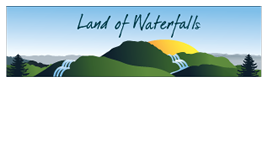
Note: This article is part of a series on street namesakes in Brevard.
Probart Poor married his second wife Sarah Ann Wilson (1832-1909) on June 12, 1856 in Hendersonville, NC. Sarah’s parents were William A. Wilson and Ruth Clayton, who was a granddaughter of Lambert Clayton. Many who are interested in Transylvania County history are familiar with Lambert Clayton, who was one of the earliest settlers in the area and had many accomplishments. The Wilsons owned abundant land in what would become Transylvania County, the location of which has been described as from Silvermont to the French Broad River at Wilson’s Bridge (Wilson Road) and bordering the present Asheville Highway from the intersection with the Old Hendersonville Highway to Strauss Park. Probart and Sarah had two children to survive until adulthood: Edwin and Ellen.
Probart Poor became more and more involved in local government. When Transylvania County was formed in 1861, Probart was one of the original organizers. The group opted to create a new county seat rather than to expand one of the existing communities. During this time, Probart managed a store that was located at what many today call “The Red House” on Probart Street. The location was built on the foundation beams of a trading post that had been built there by Leander Sams Gash, who records indicate was Probart’s nephew by marriage.
When the county founders established parameters for the center of their new town, it was determined that it should be named Brevard for a Revolutionary War patriot and located no more than five miles from W.P. Poor’s store. The Red House itself was used as a temporary courthouse, boarding house, military outpost, post office, and school.

The first session of court met in B.C. Lankford’s house on May 21, 1861. Twenty-one Justices of the Peace were appointed including Probart Poor. Probart was later given the office of “trustee” for the county which is equivalent to a general banker or treasurer. He, along with Charles Patton and James W. Killian, was charged with the task of laying out lots for the newly forming Brevard. They were required to designate a plot for the courthouse and three plots for churches and to sell the remaining lots to raise funds for a courthouse and jail’s later construction.
Probart lived out his life as a merchant but also continued to serve the county government in his role as Clerk of Superior Court beginning in 1878. William Probart Poor died on July 16, 1889 and is buried in Davidson River Cemetery. The burial was two days later, as many records show the burial date as July 18. His obituary paints a portrait of a good and honest man who served his community well. His son Edwin carried on his father’s business after his passing. Edwin married Margaret Ann Patton and Ellen married William Patton. Their many descendants live on today in Transylvania County and countless other locales.
Photographs and information for this column are provided by the Rowell Bosse North Carolina Room, Transylvania County Library. This article was written by Local History Librarian Laura Sperry. Sources available upon request. For more information, comments, or suggestions, contact NC Room staff at [email protected] or 828-884-1820.



